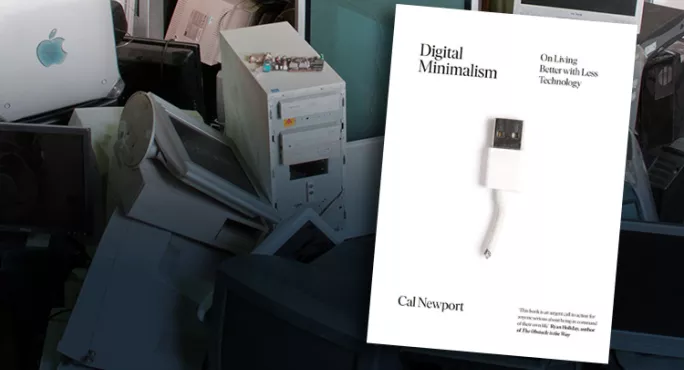- Home
- Book review: Digital Minimalism
Book review: Digital Minimalism

Digital Minimalism
Author: Cal Newport
Publisher: Portfolio Penguin
Details: 304pp, £14.99
ISBN: 978-0241341131
Should we ban mobile phones in school? More and more people think we should, so perhaps it’s a good idea to recap the reasons why we shouldn’t. The two most common ones I hear are as follows: first, tabloid scare stories focus on the most outrageous misuses of mobile phones and social media, forgetting all the valuable uses. Second, mobile phones are an enormously powerful tool that all teenagers will use in later life, so the best thing to do at school is to teach them how to manage them, not to ban them outright, which won’t prepare students for the real world.
Digital Minimalism, a new book by computer science professor Cal Newport, offers some interesting perspectives on these questions. It isn’t written specifically for teachers or students, but its take on technology offers some reasons in favour of phone bans that rebut the arguments above.
What about the valuable uses of mobiles? Of course, some of the most popular phone apps are social media ones, and these are also the ones that spark the most debate. Newport cites a study co-authored by a Facebook employee that shows that, when used meaningfully, social media can “bring us joy and strengthen our sense of community”. However, the same study shows that passive consumption of social media, characterised by lots of clicking, scrolling, and looking at strangers’ profiles, makes people feel worse.
Newport’s argument is that Facebook and other social media companies do not encourage “meaningful” use of the type recommended in this study. That’s because the profits these companies make are almost entirely determined by how much time people spend using their sites. They are what Newport calls “attention economy conglomerates”, devoted to grabbing your attention and selling it to advertisers. As he puts it, “extracting eyeball minutes, the key resource for companies like Google and Facebook, has become significantly more lucrative than extracting oil”. If everyone used Facebook in a more limited and meaningful way, billions would be wiped off its market valuation. One of the most startling moments of the book is when a Facebook executive celebrates users who spend 12 hours a day on the site. Of course, there are sensible ways to use social media. Unfortunately, the big social media companies are locked into a business model that requires them to encourage pathological 12-hour-a-day use.
These companies have access to the most sophisticated technology and most extensive data flows in history. They employ some of the brightest and most motivated people in the world and incentivise them with vast sums of money based on their ability to grab our attention and sell it to advertisers. To expect the average human being, let alone the average teenager, to resist this is completely unrealistic. It’s what Newport calls a “lop-sided arms race”.
This brings us to the second argument against phone bans: that we should teach pupils to manage phones instead. But what Newport shows is that because of this lop-sided arms race, good intentions and helpful advice are not enough. Some types of phone bans are effective ways to manage them. For adults, Newport has a series of recommendations: my favourite is Freedom, an app that lets you block other apps for set periods of time.
The aim of these extreme tactics is not to eliminate technology or phones from our lives completely, but to extract the maximum value from them. It’s “digital minimalism”, not digital elimination. Newport himself is a computer science professor and sees digital minimalism as enhancing his career by providing him with the unbroken attention his work requires. In his previous book, Deep Work, he rejected the claim that kids need to be constantly connected to the internet in order to survive in the modern economy: “Giving pupils iPads or expecting them to film homework assignments on YouTube prepares them for a high-tech economy about as much as playing with Hot Wheels prepares them to be an auto-mechanic.”
In a separate interview, Newport has compared giving children smartphones to giving them cigarettes. I feel that goes too far. Cigarettes offer no value; mobile phones do. Perhaps a fairer comparison is to junk food. The odd Big Mac now and again is a nice treat, but 20 Big Macs a week is a problem. When you realise that the business model of McDonald’s depends on you eating a lot more than the odd Big Mac, it makes you more wary of the organisation, and more likely to think that if you fancy a burger you might go home and make it yourself. Let’s get our kids excited about technology by banning phones in school and letting them play with a Raspberry Pi instead. And let’s not allow the attention economy conglomerates, with their pathological business models, to define our technological future.
Daisy Christodoulou is director of education at No More Marking and the author of Making Good Progress? and Seven Myths About Education. She tweets @daisychristo
Keep reading for just £1 per month
You've reached your limit of free articles this month. Subscribe for £1 per month for three months and get:
- Unlimited access to all Tes magazine content
- Exclusive subscriber-only stories
- Award-winning email newsletters



